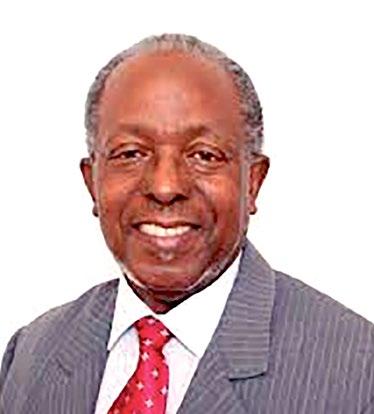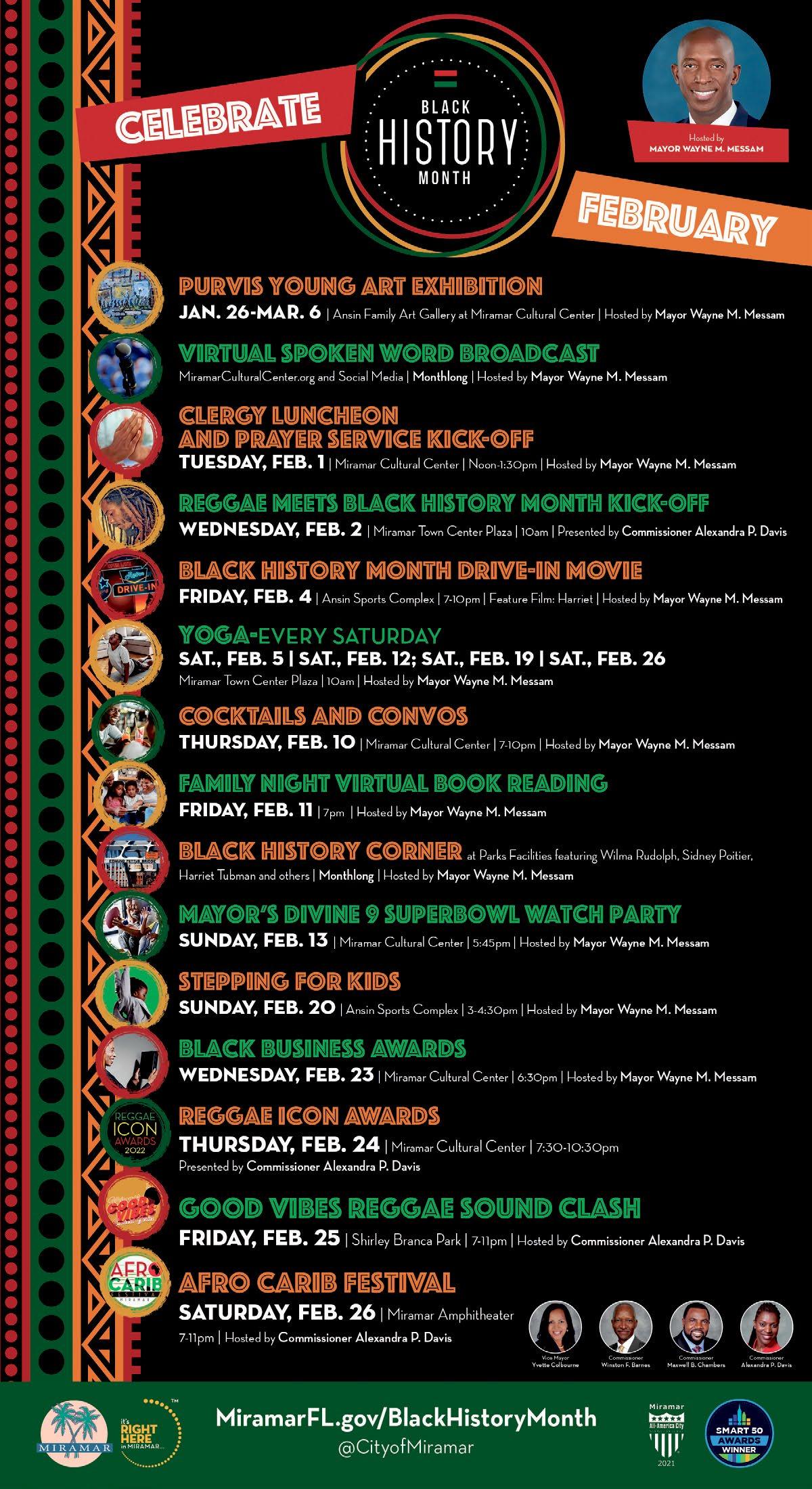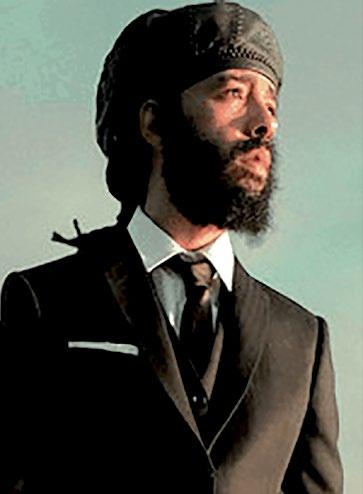
10 minute read
Black History Month
CARIBBEAN TODAY • JANUARY 2022 • 11
BLACK HISTORY MONTH One Of Jamaica’s Leading Psychiatrists Remembers The Visit Of MLK To Jamaica
Advertisement
BY HOWARD CAMPBELL
Just 36 years-old when he visited Jamaica in June 1965 Dr. Martin Luther King Jr. was preceded by a gargantuan reputation. Leader of the Civil Rights Movement in the United States, his message of nonviolence and love of enemy were pillars of his landmark speech in Washington DC in August 1961. He earned the Nobel Peace Prize in 1964.
King spent 10 days in Jamaica in the summer of 1965. At one of his designated stops, he addressed the graduating class of the University of the West Indies (UWI) at the institution’s Assembly Hall in Kingston. His speech was titled, ‘Facing The Challenge of A New Age.’
Dr. E. Anthony Allen, one of Jamaica’s leading psychiatrists and then a student at UWI at the time, helped organize the June 20th event, which attracted a full house.
As a member of the school’s Chapel Management Committee, then then 22-yearold Allen coordinated with the Jamaican government to arrange Dr. King’s visit. The American Baptist arrived in the island with an entourage that included his wife, Coretta.
Jamaica had gained independence three years earlier but was still feeling the pangs of British colonialism. Getting Dr. King to address students eager to establish a new Caribbean identity, was a major achievement.
“He had made a signal contribution to the world at the time. I felt it was right for Jamaica to have someone like him in Jamaica at that time,” Allen recalled to Caribbean Today recently. Born in Kingston, Allen was a devout Christian with strong anti-colonial beliefs. He also empathized with Jamaican blacks who, despite being the overwhelming majority, were often treated as second-class citizens.
Dr. King’s speech touched largely on social imbalance and poverty in countries like India where he and his wife visited. He also spoke about the challenges of colonialism and the growing independence surge in Africa.
“We have seen this magnificent drama of independence taking place on the stage of Asian and African history, and in the Caribbean area, and it reveals to us that the old order of colonialism is passing away. The new order of freedom…. political independence and human dignity is coming into being,” said Dr. King at the time.
Allen remembered the atmosphere in the hall vividly.
“It was tremendous. The Assembly Hall was packed and when he spoke you could hear a pin drop. Everybody was literally hanging on to his words. He spoke for about 40 minutes without any notes,” he told CT recently.
Dr. Martin Luther King’s visit to the University of the West Indies is chronicled at the school’s museum.
In a speech after his visit, Dr. King described Jamaica as “the most beautiful island in the world”. He was struck by how people of different races cohabited, unlike the United States where the racism he fought against, was embedded.
“And so, for those days we travelled all over Jamaica. And over and over again I was impressed by one thing. Here you have people from many national backgrounds: Chinese, Indians, so-called Negroes, and you can just go down the line, Europeans, European and people from many, many nations,” he noted. “Do you know they all live there and they have a motto in Jamaica, ‘Out of many people, one people.’ And they say, ‘Here in Jamaica we are not Chinese, we are not Japanese, we are not Indians, we are not Negroes, we are not Englishmen, we are not Canadians. But we are all one big family of Jamaicans.’”
Allen was on staff at the UWI on April 4, 1968, when he got news that Dr. King was assassinated in Memphis, Tennessee.
“That was shocking. There was a great sense of loss,” he reminisced as the US marks another Black History Month.
Dr. E Anthony Allen

Dr. Martin Luther King Jr. visiting Jamaica in 1965. (Twitter/JAG Production VT image)
Y

5 Caribbean Nationals In US Black History You Should Know
It’s Black History Month in the US and as has now become a norm – lost in the shuffle – is that significant contribution of Caribbean nationals in the annals of US’ black history. Here are five you should know:
THE BAHAMAS Bert Williams
One of the pre-eminent entertainers of the Vaudeville era and one of the most popular comedians for all audiences of his time, Bert Williams, was born in Nassau, Bahamas in 1874. At the age of 11, Bert permanently emigrated with his parents, moving to Florida. The family later moved to Riverside, California, where he graduated from Riverside High School. He would go on to become by far the best-selling black recording artist before 1920. In 1918, the New York Dramatic Mirror called Williams “one of the great comedians of the world.” In an age when racial inequality and stereotyping were commonplace, he became the first black American to take a lead role on the Broadway stage, and did much to push back racial barriers during his three-decade-long career.
Estelle Rolle Evans
Estelle Rolle Evans was a Bahamian born actress during the 20th century. Some of her most famous appearances were in the movies The Quiet One (1948), To Kill a Mockingbird (1962), and The Learning Tree (1969). Evans was born in Nassau, New Providence, The Bahamas in 1906, to parents Jonathan and Elizabeth Iris Rolle (née Dames). She was the oldest of eighteen children. Evans died on July 20, 1985, in New York City at age 78.
Rosanna Rolle Carter
Rosanna Rolle Carter, who during the Harlem Renaissance, acted at the New Lafayette Theater as one of the Lafayette Players and later in The Brother from Another Planet, a wellreviewed 1984 film described as a science fiction fairy tale with a slavery plot, was born in New Providence, Bahamas in 1918. Carter received an AUDELCO award in 1977 for her work as a supporting actress in the play, Unfinished Women and was nominated for an Emmy Award as Outstanding Guest Actress in a Drama Series in I’ll Fly Away in 1993. She died at age 98 in Pompano Beach, Florida.
Father John Edwin Culmer
Father John Edwin Culmer was a minister and leader during the Civil Rights Movement, most notable for his work in Miami, Florida, United States. Father Culmer was born in 1891 in Eleuthera, Bahamas before migrating as many Bahamians did, to Florida . He attended Oskaloosa College, where he received a B.A. in music and later a bachelor of divinity degree from Bishop Payne Divinity School. He has also received honorary doctorates from BethuneCookman College and the Virginia Theological Seminary. After leading a ministry in Tampa, in 1929, Culmer was transferred to the Saint Agnes Church in Miami where he helped the poorly established church become one of the most acclaimed congregations in the American South. During his tenure as minister, he also served on the Dade County Senior Citizens Board, and headed Miami’s Peaceful Integration committee. Culmer also was chairman of the Fact-Finding Committee of the Greater Miami Negro Civic League, where he brought national attention to the deplorable housing and sanitation conditions of African Americans in Miami. This led to the building of the Liberty Square housing project, which opened in 1937. Father Culmer died on June 18, 1963. The Culmer Metrorail station, just northeast of the Spring Garden neighborhood of Miami, Florida, is named in his honor.
Banking for what’s next.
Our goal has always been to help meet yours. Today, we’re here for you in more ways than ever. With more locations, more services, and more expertise to help you wherever life takes you.

This is banking at its best.
This is Banking Forward. BARBADOS Frank L. White
Barbados-born Frank L. White was a professional chef best known as the model for the fictional breakfast chef, often identified as “Rastus” on the boxes of Cream of Wheat breakfast cereal. White immigrated to the U.S. in 1875, where he became a citizen in 1890. He was working as a master chef at a Chicago restaurant at the time he was photographed for the cereal box in 1900. He died at age 70 in Leslie, Michigan and is buried at Woodlawn Cemetery in Leslie.
- NewsAmericasNow.com
Y
Check Out These Black History Month Events In South Florida
Throughout South Florida, there is a number of events to check out, all month.
ALL FEBRUARY
Check out ‘60 Years of Black Art: Works by Dillard Center for The Arts’ AP students all month. The exhibit represents themes of equality from the perspective of students at the school that was instrumental in overturning segregation laws in the City of Fort Lauderdale 51 years ago.
The exhibit can be seen at the New River Inn building of History Fort Lauderdale, 231 SW Second Ave. daily from 10 a.m. to 4 p.m., with docent guided tours daily at 1, 2 and 3 p.m. Admission is $15 for adults; $12 for seniors and $7 for students (through age 22 with a valid student ID). Admission is free for members, military and children 6 and under. For information, call 954-463-4431 or visit
historyfortlauderdale.org.
FEB. 12
Catch the inauguration of ‘Immortalizing a New Generation” exhibit, featuring photographs by Regis and Kahran Bethencourt on Feb. 12th from 1-3 p.m. Sponsored by the Miami-Dade County Black Affairs Advisory Board Heritage Planning Committee & The Historic Hampton House; the event is set for 4240 NW 27th Ave., Miami. Call 305-638-5800 or 305-375-4606 or visit www. historichamptonhouse.org.
Also on Feb. 12th, catch The Shrine: Afrobeats, Kompa and Caribbean Vibes from 9 p.m.-2 a.m. at Red Rooster Overtown, 920 NW Second Ave., Miami. Free tickets with registration at https://
www.eventbrite.com/e/theshrine-tickets FEB. 19
Catch ‘Black Is Black Ain’t,’ a Ghetto Conscious Exhibition celebrating independent local Black authors. The event pays homage to “Black Is Black Ain’t,” a documentary released in 1995 by Marlon Riggs and is presented free, by E.A.T.N. and Miami-Dade County from noon to 3 p.m. at St. Thomas University, 16401 NW 37th Ave., Miami Gardens.
FEB. 24
Be part of the free Reggae Icon Awards 2022 as Black History Meets Reggae from 6:30-10:30 p.m. at the Miramar Cultural Center Banquet Hall, 2400 Civic Center Pl., Miramar. See more at https://
caribbeanriddims.com/event/ brunch/.
FEB. 25
The groundbreaking Alvin Ailey American Dance Theater returns with new and classic works, including founder Alvin Ailey’s masterpiece, “Revelations,’’ at 8 p.m. on Feb. 25th and through Feb. 26th at the Adrienne Arsht Center for the Performing Arts, 1300 Biscayne Blvd., Miami. Tickets are $25-$125.
FEB. 26
Catch the Afro Carib Festival with performances from reggae star Protoje, Afro B and EIX from 7-11 p.m. at Miramar Regional Park Amphitheater, 16801 Miramar Pkwy., Miramar. Tickets at Ticketmaster are $15-$45. Parking is $10.
Miramar Commissioner Alexandra P. Davis stated: “I am thrilled to be able to bring back this exciting festival under the stars at the Amphitheater at Miramar Regional Park. The headliners have all made a mark in their respective genres. I can’t wait to party with music lovers from all over in this great open-air venue. Guests will be able to immerse themselves in the festival experience. All while celebrating Black History Month and Reggae Month, in a familyfriendly atmosphere. This is going to be an experience you won’t soon forget.”
Local food vendors will serve up their specialty Caribbean and African dishes and merchandise. Vendors will offer up their unique products representing a variety of cultures.
COVID-19 protocols will be observed, and masks are encouraged.
And celebrating Black Life, History and Culture with a free outdoor event with stories and activities for children and their families at Arcola Lakes Branch Library, 8240 NW Seventh Ave., Miami. Masks are required. Social distancing is encouraged. Call 305-694-2707.







